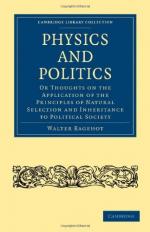18. And if you look distrustfully on imaginary tragedies, you have only to investigate some of the greatest dramas of authentic history to find that in these too the destinies of men are no different: that their ways are the same, and their petulance, their revolt and submission. You will discover that there too it is a force of man’s own creating that plays the most active part in what if pleases us to term “fatality.” This fatality, it is true, is enormous, but rarely irresistible. It does not leap forth at a given moment from an inexorable, inaccessible, unfathomable abyss. It is build up of the energy, the desires and suffering, the thoughts and passions of our brothers; and these passions should be well known to us, for they differ not from our own. In our most inexplicable moments, in our most mysterious, unexpected misfortunes, we rarely find ourselves struggling with an invisible enemy, or one that is entirely foreign to us. Why strive of our own free will to enlarge the domain of the inevitable? They who are truly strong are aware that among the forces that oppose their schemes there are some that they know not; but against such as they do know they fight on as bravely as though no others existed; and these men will be often victorious. We shall have added most strangely to our safety and happiness and peace the day that our sloth and our ignorance shall have ceased to term fatal. What should truly be looked on as human and natural by our intelligence and our energy.
19. Let us consider one noteworthy victim of destiny, Louis XVI. Never, it would seem, did relentless fatality clamour so loudly for the destruction of an unfortunate man; of one who was gentle, and good, and virtuous, and honourable. And yet, as we look more closely into the pages of history, do we not find that fatality distils her poison from the victim’s own wavering feebleness, his own trivial duplicity, blindness, unreason, and vanity? And if it be true that some kind of predestination governs every circumstance of life, it appears to be no less true that such predestination exists in our character only; and to modify character must surely be easy to the man of unfettered will, for is it not constantly changing in the lives of the vast bulk of men? Is your own character, at thirty, the same as it was when you were ten years younger?




